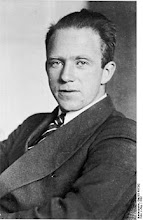It remains an irony, however, that much of the American public is still scientifically illiterate and that as a nation we often have the same sense of wonder when viewing alleged photos of UFOs or spirits o
 n the stairway. Most Americans know the name of the famous space telescope, but don’t know anything about the man for whom it is named. Among many notable accomplishments, Hubble was the first astronomer to conclusively demonstrate that the Universe was composed of a number of galaxies, further relegating humanity to a place of insignificance. Adding insult to injury, he laid the foundation for the determination that the Universe itself is expanding, making us a smaller and smaller part of whatever it is we are a part of. For this cosmic reality check, he surely deserves our gratitude.
n the stairway. Most Americans know the name of the famous space telescope, but don’t know anything about the man for whom it is named. Among many notable accomplishments, Hubble was the first astronomer to conclusively demonstrate that the Universe was composed of a number of galaxies, further relegating humanity to a place of insignificance. Adding insult to injury, he laid the foundation for the determination that the Universe itself is expanding, making us a smaller and smaller part of whatever it is we are a part of. For this cosmic reality check, he surely deserves our gratitude.While all this was going on this week, there was also a semi-controversy surrounding the release of the movie Angels and Demons, Ron Howard’s visual interpretation of Dan Brown’s best selling mediocre thriller. For those of you who are interested, the plot involves somebody trying to blow up Vatican City with a matter/anti-matter bomb, perhaps in retribution for the Catholic Church’s historically poor attitude toward scientific inquiry. I admire Tom Hanks as an actor and most of Ron Howard’s directorial efforts have been outstanding, so I will probably eventually get around to seeing the movie, but I doubt it will stand as a landmark in the philosophical debate over the extent to which religious faith and scientific empiricism conflict.
Angels and Demons and Edwin Hubble sort of ran together in my mind as I watched a review of the current speculation over Dark Matter, Dark Energy and the fate of existence (this was just before I flipped over to the Ray’s game). To greatly oversimplify, the observed Universe doesn’t behave the way it ought to based upon assumed gravitational laws applied to the amount of visible matter. So either our understanding of gravity is fried, or there’s a lot more junk out there than meets the eye. The Hubble Space telescope has (no pun intended) shed a great deal of light on the Dark Matter issue, but it turns out that there is still a lot of the Universe theoretically missing, and even counting all the crap in my garage, scientists still can’t figure it out.
To add to the confusion, there is apparently an anti-gravitational force cleverly named Dark Energy which is speeding up the expansion of the Universe. Darth Vader’s gleeful chuckles aside, this theoretical force has just about ensured that the Universe will continue to expand infinitely into a cold, dead, nearly absolute vacuum where life is not possible (much like the interior of a Republican’s head). This sort of depressing outcome is the more likely scenario than the equally depressing outcome where the Universe is slowly dragged back upon itself by gravitational forces until it collapses into an infinitely dense point where, coincidentally, life is not possible.
For those of us that may have faith in an afterlife safely remote from the cosmological fire or ice, these are minor points, since God will punish fornicators and reward the righteous, but for those of us who are less than certain about this happy ending, it scientifically becomes an obligation not just to accept our own mortality, but to recognize that all human endeavor, no matter its magnificence or duration, will ultimately be wiped away with no one left to mourn. Science can really be a bummer sometimes.
On the plus side, as I write this, our lazy overpriced mutt-like purebred is sleeping next to the window with full benefit of a gentle afternoon breeze and there are big, puffy white clouds hovering in a crystal blue sky. One of my teenage sons is sweatily doing the yard work once reserved exclusively for me, the water temperature in the pool is 72° and there is a driving range five minutes away with large buckets of balls for only $6.00. Dark Matter may be stealthily lurking out there somewhere up to whoknowswhat, and Dark Energy may be destroying the Universe faster than God can create it, but it is a beautiful Spring day on the coast of Florida and at this very moment, you, me, Dan Brown, the Pope, the Hubble Telescope, the dog, and all of the Universe’s darkness are stuck dead in the middle of eternity, where we shall always remain.









No comments:
Post a Comment